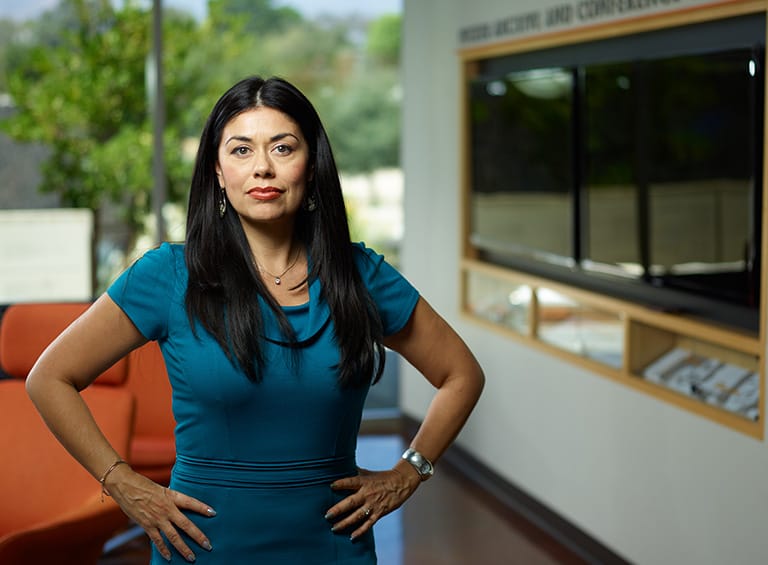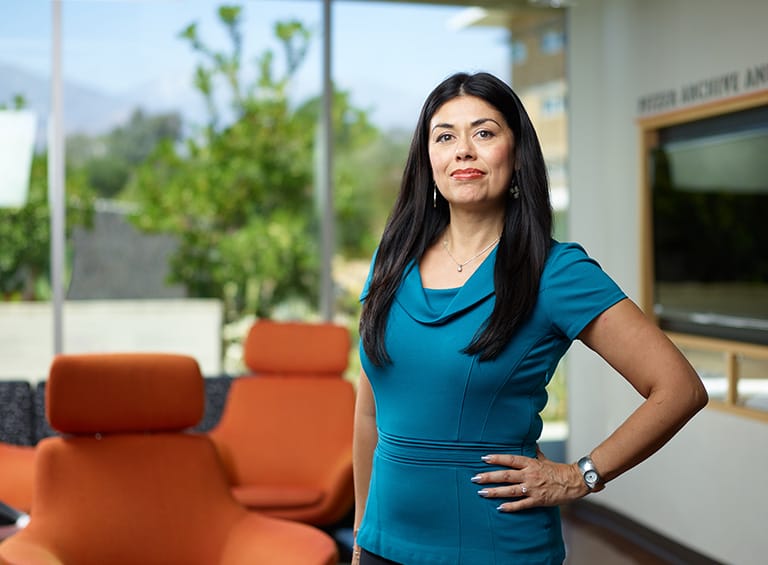Education Alumna Yvonne Berumen Champions Access and Equity

Just over a year ago, School of Educational Studies alumna Yvonne Berumen (MA, Education, ’05) was named Pitzer College’s new vice president for admission and financial aid. A Pitzer alumna who has worked in college admissions for 17 years at Occidental College, Pitzer, and Mount Saint Mary’s University in Los Angeles, Berumen is an advocate for first-generation and underrepresented students, working with parents, educators, and other community-based officials to promote higher education and facilitate access across the Los Angeles region. We spoke with Berumen—a first-generation student herself—about her educational and professional experiences.
How does promoting college attainment among urban and underserved populations propel your work?
Access and equity have always been at the heart of my career. I strongly believe higher education has the power to change lives and family trajectories. One family member’s success can inspire and propel others to do the same, and more. It’s paramount that as educational leaders who understand the challenges of urban, rural, and underserved populations, we continue to promote college attainment and career success to advance our country.
How does being a first-generation college student inform your work?
My background as a first-generation college student fuels my passion for access and provides me with a valuable perspective to share. I can personally relate to many of the challenges this population faces—economic, social, and cultural. For example, the application process can feel overwhelming and intimidating to a first-generation college student. As education professionals, we should strive to demystify the college and financial [aid] process. The language we use to promote higher education should be mindful of all of our constituents.

What motivated you to pursue an undergraduate degree?
I was blessed to have supportive parents that may not have understood how to help me with the college process, but always encouraged me to do my best. Further, I went to a high school with amazing teachers and counselors that both nurtured and challenged us. My undergraduate and graduate experiences were similar. I had mentors that pushed me to expect more of myself. Still, I could never have dreamt or imagined that I would be vice president of admission and financial aid for my alma mater. I was the student that was intimidated to apply to college! At the time, I didn’t know anyone who held a bachelor’s degree, except my teachers. It’s difficult to identify a possible calling when your understanding of careers is limited. Through it all, it was my faculty and mentors in the profession that convinced me that I could succeed in this role. And, if I had questions, they could help me.
As I look back at my career, I realize that it was necessary for me to succeed. Like my mentors, I want to continue to challenge others to see beyond their own expectations. Our backgrounds shouldn’t dictate our future; instead, it should fuel us to do more for ourselves and our communities.
What prompted you to pursue a master’s degree at CGU?
I applied to CGU after my first professional promotion. At the time, I was still considering a variety of different professions. To be honest, I chose to pursue graduate school in the hopes of gaining more insight regarding my career path. CGU was close and had a flexible program for working adults that complemented my interests. The faculty were knowledgeable and experienced in all facets. The students also came from varied positions and organizations that made for enriching discussions. This was especially important for me given I was only five years out of college and had limited professional experience.
[Professor of Education] David Drew, however, was the greatest surprise in my education at CGU. He stretched me professionally by sparking a love for quantitative measures and data analytics. I would never have considered myself a mathematically inclined person, but developing this new skillset gave me greater breadth because data and numbers transcend industries. Since graduating from CGU, I have worked in the nonprofit sector, and secondary and higher education. And I had the pleasure of developing logic-based applications, student information systems, and algorithms, and built predictive models to inform enrollment strategies. My goal is to eventually develop a retention model that’ll promote success and alert college officials when interventions are necessary.
What has your newest role at Pitzer taught you so far?
Beyond the day-to-day activities, I have realized that my role is more than just a vice president for admission and financial aid, but more importantly as a community member and leader at Pitzer.
The [November 2016] elections and initiatives truly tested the community and imbued it with a level of uncertainty and fear. Given these external challenges, it was imperative that we, as a leadership team, support our community by reaffirming Pitzer’s mission of social responsibility and intercultural understanding. And as community members, we acknowledge the personal sentiments that were permeating the campus climate.
If asked “What was my biggest surprise coming into this role?” I would have to say that it is the current political climate and decisions made at the federal level. For example, access to financial aid is being threatened and affecting not just Pitzer students, but college students throughout the country. Executive decisions made at the federal level are endangering the safety and experience of immigrant and international students on college campuses. Whether they affected campus climate or operational structures, these polarizing decisions forced us reflect and take action.
Regardless of current or future challenges, I know this is where I was meant to be. Pitzer College was integral in my development as a socially responsible citizen of the world and I hope to continue that legacy by recruiting and enrolling future generations of Pitzer students.